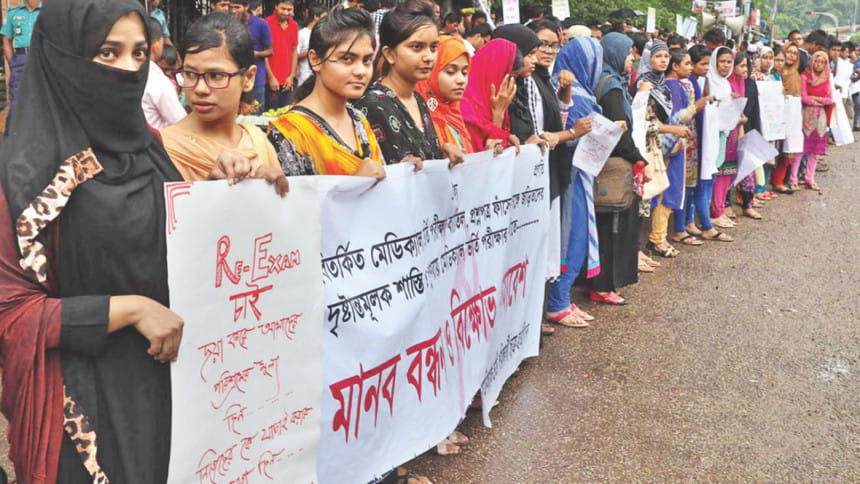QUESTION PAPER LEAK: IT'S TIME TO OVERHAUL THE SYSTEM

Question paper leak phenomena in Bangladesh are as old as the hills. We read or hear about such instances every single year. In light of the ongoing protests against the medical admission test question paper leak, it is worth pondering upon what this noxious practice means for the future of prospective students, the quality of students and professionals Bangladesh will produce in the coming years and the education system as a whole in the country.
There has been a staggering 64 allegations of question paper leaks in the last four years alone. It is a well-known fact that government employees, coaching centres, guidebook traders and students are part of a growing, profitable criminal network dedicated to leaking question papers. RAB has recently arrested seven people including three government doctors and a UGC assistant director for their involvement in the leaking of medical and dental admission question papers. And the collusion of public officials is hardly surprising.
Many questions, therefore, arise: How does this affect the image of public educational institutions since some of the highest authorities function as the instrumental organs in this shady business? When the "guardians" of public colleges, who are supposed to ensure that exams are conducted in a fair and transparent manner, cash in on the art of cheating, what message does that send to the coming generations? What does this mean for the quality of future doctors and public professionals we will churn out?
Students don't mind buying off exam papers if that means they'll get into the medical and/or public school of their choice. But with the public education system already in a shambles, such malpractices serve to demean the value of education and damage the prospects and morale of hardworking, meritorious students. Question paper leaks marginalise bright students, especially those who cannot afford alternatives such as foreign education, and degrade the quality of the future crop of professionals and leaders. With the window of opportunity that is the demographic dividend, youths, from an early age, are getting into the toxic habit of memorising answers from leaked question papers ahead of examinations. With a growing pool of graduates and increasing demand for higher education, what we're doing is paving the pathway for all students -- regardless of merit -- to resort to cheating and essentially teaching them that hard labour bears no fruit. With a top-down culture of impunity (evident by the frequency of question paper leaks) students are fast losing faith in the public education management system. In addition, the brutal treatment of student protesters at the hands of law enforcers is catalysing the dissipation of students' overall confidence.
It is worth contemplating as to why more isn't being done to strengthen online monitoring since social media is the primary platform of leaked question/answer sharing. With laws like the ICT Act geared towards surveilling the blogosphere and sites such as Facebook and Twitter, why is it that culprits responsible for leaking questions online are roaming free instead of being apprehended? It seems like the online police are only concerned about incarcerating those guilty of spouting offensive speech. Are the other crimes taking place within the online space not worth investigating? It is incomprehensible as to why despite such incidents having become commonplace, there is no mechanism in place designed to detect question paper leaks on the internet and identify the offenders who are making big bucks out of this immoral enterprise.
With students and teachers protesting the removal of VAT on education and demanding pay hikes respectively, the education system as a whole has come under severe scrutiny in recent times. And with government employees in particular being incriminated in such cases without fail, TIB's claim that question papers cannot successfully be leaked without the collaboration of public officials -- including those of the Primary Education Directorate, Education Boards and Bangladesh Government Press -- remains valid. The Education Ministry's constant denial, in this regard, is baffling. Claiming to simply having "taken action" is not satisfactory. Pre-emptive measures are necessary to prevent question papers from leaking in the first place. But such crime control measures, i.e. exposing these rackets, address only a minor aspect of a much bigger problem.
The fact that students can pass exams with flying colours with the help of leaked question papers points towards a glaring hole in these public examinations themselves. If they truly did test students' critical thinking skills, I doubt it would be this easy to simply rely on memorisation skills. It would be much more challenging to resort to leaked test papers that assess one's creative skills and that prompt one to think on his or her feet. For instance, with standardised tests such as the GRE, examinees are given different questions which largely eliminate their chances of passing the test by memorising answers if the test papers were to leak. Although reforming public examinations in Bangladesh is in no way an easy feat, there's a lot that the Education Ministry can take away from such globally practiced standardised tests. Higher authorities, therefore, ought to understand that the current system of public examinations simply isn't up to par. Much more needs to be done than to simply quash criminal rackets, and it's time we think about overhauling the public examination system.
The writer is a journalist at The Daily Star.

 For all latest news, follow The Daily Star's Google News channel.
For all latest news, follow The Daily Star's Google News channel. 



Comments